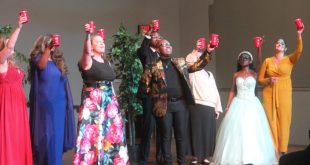There’s an art to writing an editorial. It is supposed to spark a movement, however small that may be. It is supposed to be a catalyst to thought and eventually change. The theory behind it is, to put it simply, start a revolution on a small scale (or big scale if you’re a good enough writer).
Topics are not easy to come up with, and it is even harder to get your point across in a clear, impacting way. Take this one for example: I have probably already lost you and you’re about five seconds away from turning to the sports page. Bear with me for a minute and I’ll come around to a point.
Writing an editorial is a small, monthly challenge that I ask each editor to embark on a few times a semester. And make no mistake – it’s a challenge to write an editorial that people will actually want to read. But that is what writing and academia are about: being faced with a challenge and overcoming it.
That ideal translates to life outside of school (work place, social life, financial life and etc.) and for that I am thankful for the challenges I have faced while in the protective custody of VSU and the English department.
But the “mama bird” syndrome has to end eventually and we must move out of the bird nest that is VSU.
Whether it is into a career or the Peace Corps (good luck Michael), without those challenges we would have no chance at survival.
So for those graduating – be thankful for all that you have overcome during the four, five or six plus years you have been here.
For those with challenges still ahead – be aggressive and attack the challenges instead of letting them get the best of you – you will be thankful for them when you look back.
So when you sit down and write your own editorial, think of all the challenges that you have overcome and all that lies before you and think what will spark a movement: become the catalyst to your own change and write your piece.
Once you face the challenges head-on, your editorial will start a revolution, that you can be sure of.
This editorial was written by Lee Johnson (gljohnson@valdosta.edu) and it expresses the opinion of the entire editorial staff.
 The Spectator The independent student newspaper of Valdosta State University
The Spectator The independent student newspaper of Valdosta State University







